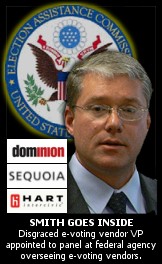 "Today's ruling by the Supreme Court strikes at the core of our democracy. The framers could never have imagined, and surely didn't desire, a system in which corporations could pour literally billions of dollars into elections and hold virtually limitless influence over the fate of our elected representatives. Such a system does not promote free speech; it mocks it.
"Today's ruling by the Supreme Court strikes at the core of our democracy. The framers could never have imagined, and surely didn't desire, a system in which corporations could pour literally billions of dollars into elections and hold virtually limitless influence over the fate of our elected representatives. Such a system does not promote free speech; it mocks it.
"As Justice Stevens pointed out in his dissent, corporations are not people. They are not citizens. They do not have a right to vote and they can not be given unlimited power to influence elections.
People For the American Way Calls for Constitutional Amendment to Undo Supreme Court Decision
FBI broke law for years in phone record searches
 The FBI illegally collected more than 2,000 U.S. telephone call records between 2002 and 2006 by invoking terrorism emergencies that did not exist or simply persuading phone companies to provide records, according to internal bureau memos and interviews. FBI officials issued approvals after the fact to justify their actions.
The FBI illegally collected more than 2,000 U.S. telephone call records between 2002 and 2006 by invoking terrorism emergencies that did not exist or simply persuading phone companies to provide records, according to internal bureau memos and interviews. FBI officials issued approvals after the fact to justify their actions.
U.S. indicts four Israelis in international bribery case
 The United States Justice Department indicted four Israeli businessmen Tuesday for allegedly attempting to bribe the defense minister of an African country in order to secure a multimillion-dollar contract to supply his country with military equipment. 18 other businessmen were indicted in the same case.
The United States Justice Department indicted four Israeli businessmen Tuesday for allegedly attempting to bribe the defense minister of an African country in order to secure a multimillion-dollar contract to supply his country with military equipment. 18 other businessmen were indicted in the same case.
Meet Mikey, 8: U.S. Has Him on Watch List
 It is true that Mikey is not on the federal government’s “no-fly” list, which includes about 2,500 people, less than 10 percent of them from the United States. But his name appears to be among some 13,500 on the larger “selectee” list, which sets off a high level of security screening.
It is true that Mikey is not on the federal government’s “no-fly” list, which includes about 2,500 people, less than 10 percent of them from the United States. But his name appears to be among some 13,500 on the larger “selectee” list, which sets off a high level of security screening.
Disgraceful: Discredited E-Voting Vendor VP Appointed to U.S. EAC Advisory Panel
 Federal body tasked with overseeing U.S. certification of e-voting systems appoints scammer Edwin Smith, VP of e-voting companies Sequoia, Dominion, Hart-Intercivic...
Federal body tasked with overseeing U.S. certification of e-voting systems appoints scammer Edwin Smith, VP of e-voting companies Sequoia, Dominion, Hart-Intercivic...
Incredible. This would be the equivalent of appointing the sitting Vice President of Exxon Mobil to an EPA advisory committee, but Ed Smith has now been appointed to the disastrous U.S. Election Assistance Commission's (EAC's) Technical Guidelines Development Committee as one of their new "Technical and Scientific Experts."
US 'video terrorist' pair jailed for 17 and 13 years
 Two US men convicted of plotting to aid terrorists by filming landmarks and sending the clips abroad have been given lengthy prison sentences.
Two US men convicted of plotting to aid terrorists by filming landmarks and sending the clips abroad have been given lengthy prison sentences.
Ehsanul Islam Sadequee was jailed for 17 years, three years less than the prosecution had requested. Sadequee, 23, also went to Bangladesh to meet terrorist cells and tried to help a Pakistani militant group. His friend and co-defendant, 24-year-old Syed Haris Ahmed, got 13 years in prison and 30 years supervised release.
Kellner: Stop Electronic Voting
 New York State Elections Board Co-Chair Doug Kellner testifed to the NY Senate last month that the state should "Stop talking about trying to go to electronic voting."
New York State Elections Board Co-Chair Doug Kellner testifed to the NY Senate last month that the state should "Stop talking about trying to go to electronic voting."
Mr. Kellner further stated that he has "advocated keeping the lever voting machines permanently." During his testimony, Kellner cited many problems in the State's "Pilot Program" for the electronic voting machines used in upstate NY during the Nov. 3rd, 2009 elections.
More Articles...
Page 173 of 220

 Domestic Glance
Domestic Glance






























